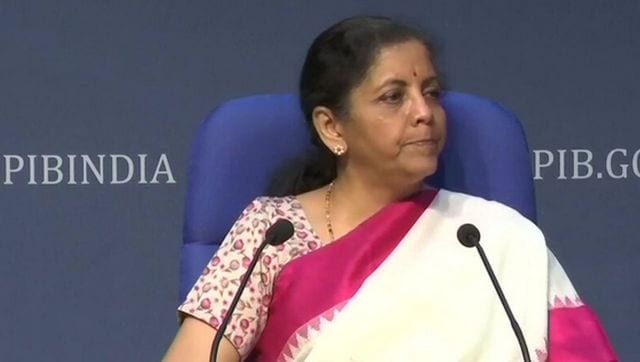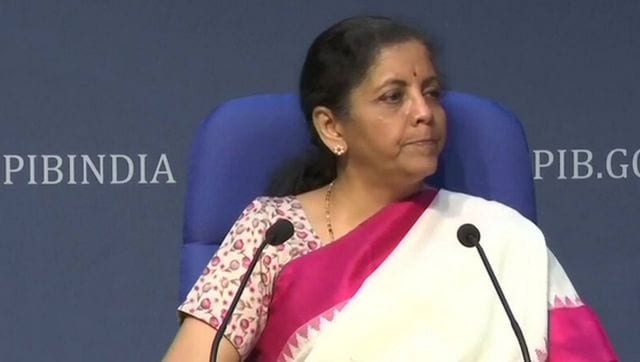Nirmala Sitharaman’s LTC, festival schemes for Central employees cue for states to fix their finances
With many of the states already facing a fund crunch, they are going to be in more difficulty to match the Centre’s largesse.

Union finance minister Nirmala Sitharaman.
First, the finance ministry has not yet offered a real second stimulus for the economy, despite the announcements made on Monday. As one understands, the actual piece is still in the works. Most likely, it shall be more like an extension of the production linked incentive schemes for more sectors and could be out before Diwali.
But still do not expect any across the board tax cut in the list of announcements. The finance ministry’s packages so far have repeatedly made it clear that all offers for support to sectors shall be tailored to specific performance goals.
It is here that the markets often slip up in their expectations. On Monday as Finance Minister Nirmala Sitharaman began speaking, the expectations of a cut in long term capital gains (LTCG) tax by the markets got mixed up in an alphabetic mix up with the announcement of a change in leave travel concession (LTC) rules.
The distraction soon subsided and with that the excitement about the latest fiscal package too. What it does reveal however is the dissonance between what the broader economy would want to hear from North Block and what it is getting to hear!
It is for this reason that a broad-based income tax cut is unlikely to come through, not just in this fiscal but also in Budget 2022. For now, the minister has offered for Central government employees a tax-free cash payment and leave encashment of their LTC entitlements. Under the existing rules in each block of four years, government employees can get a one-time tax free reimbursement of their holiday travel for themselves and their families.
Sitharaman has now offered the same reimbursement without the need to travel. She has also offered a Special Festival Advance Scheme as a one-time measure for all employees.
The catch is of course that the employees have to spend thrice the amount to get reimbursed. So if an employee and her family is entitled to a Rs 10,000 voucher from the government, she will have to spend three times the sum or Rs 30,000 to earn it.
It does not mean the employee cannot spend a lower sum but the 3:1 proportion shall be retained even then too. And yes, it cannot be broken into more than one spending plan. One understands that in the discussions of the government with the union representatives it was suggested that the ratio should be 2:1 but then that got bumped up. The government estimates that with similar offers from state governments, the additional consumer demand in the economy will be about Rs 28,000 crore.
Would it enthuse the employees to spend? Permanent staff at the Centre and at the state governments are the only ones whose pay has not faced cuts in this pandemic. Yes, the increase in the six-month dearness allowance has been deferred but there has been no reduction in their monthly paychecks.
Yet is it likely that the money earmarked by the Centre for the LTC package will be picked up by the employees? If one goes by the evidence of diminished marginal propensity to consume by the poorest segment of the population, one could suspect that the government’s expectations are misplaced. But that extrapolation would be wrong because as one pointed out the government employees have faced no pay cuts. Yes, they are worried about the spectre of the rising risk of medical care, but this is also the segment whose entire risk is covered by their health schemes.
Aditi Nayyar, chief economist at ICRA wrote in her note that “We anticipate that the LTC and festival advance schemes will result in a temporary boost to consumer sentiment and economic activity, with a sharper pick up in festive season sales that would subsequently fizzle out.” This seems an accurate assessment of the impact.
Statistics show government employees have never left the LTC offered to them go waste. The utilisation rate is above 90 percent in all block years. While this year’s offer is more difficult to make use of, there is no reason to doubt therefore that there shall be a generous pick up.
What does it do to the broader economy in terms of demand revival? For the FMCG sector with about Rs 3.4 trillion top line, the additional spend is significant. The sales of white goods shall certainly expand handsomely. Notice that over the past couple of months the stickers for discount offers on sales of most goods have disappeared. This does mean that inventory build-up for these companies has come down. To that extent, there should be more backhaul demand for intermediate goods from these companies over time. But would it save the company results of the third quarter?
It seems unlikely as the lead time is too short. The production lines should be benefitted going into the next financial year, but then most commentators have already pencilled in a sharp rebound in FY22. It also means the growth deceleration in the economy over this financial year shall persist.
For the states, the message from the latest package is clear. They are going to be in more difficulty to match the Centre’s largesse. Several of them have not cleared the arrears of salaries and allowances of their employees for almost upto a year. They have a genuine financial challenge to meet their budget constraint this year. Yet it will be an even more difficult political messaging for these states to argue that their unpaid arrears to their employees is because of their GST deficit and which should be overcome by support from the Centre.
The states should not be forced to borrow more from the markets. When Sitharaman said she will not sign on to measures that put the government debt “on an unsustainable path” she was addressing the hold out states.
Government employees are often opinion leaders in their communities. The message for them from the Centre is it is keen to revive demand in the economy but some of the states are digging their heels in against this. The Centre has dug into its resources to finance it and so the states must do likewise. The sight of Central government employees buying stuff with more cash while their state government staff in the same neighbourhood remain high and dry makes for hot political weather at the state capitals.
Find latest and upcoming tech gadgets online on Tech2 Gadgets. Get technology news, gadgets reviews & ratings. Popular gadgets including laptop, tablet and mobile specifications, features, prices, comparison.
#Nirmala #Sitharamans #LTC #festival #schemes #Central #employees #cue #states #fix #finances































